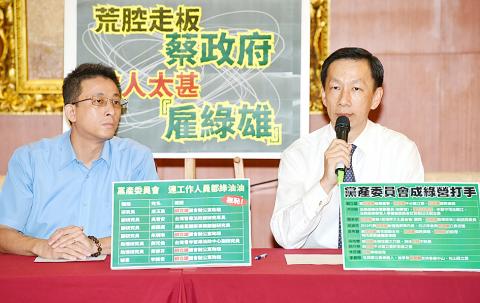The Chinese Nationalist Party (KMT) yesterday threatened to stage a protest amid an escalating investigation into its assets, saying that the Democratic Progressive Party (DPP) is manipulating the Ill-gotten Party Assets Settlement Committee to bring down the KMT, with the DPP saying the “mudslinging” shows that the KMT has little ability to understand and reflect on its wrongdoings.
The majority of the committee’s members are affiliated with the DPP, making the committee a partisan tool against the KMT, KMT Culture and Communications Committee deputy director Hu Wen-chi (胡文琦) told a news conference.
Hu said committee chairman Wellington Koo (顧立雄) flip-flopped on legal interpretations of the Act Governing the Handling of Ill-

Photo: Chu Pei-hsiung, Taipei Times
gotten Properties by Political Parties and Their Affiliate Organizations (政黨及其附隨組織不當取得財產處理條例), making the committee a “secret police” that acts outside the law to pursue a political vendetta.
“In the face of the DPP’s ruthless political persecution, the KMT will not rule out the possibility of staging a protest at the DPP’s headquarters,” he said.
KMT Culture and Communications Committee deputy director Tang Te-ming (唐德明) criticized the staffing of the committee, saying Koo hired his personal assistants and Southern Taiwan University of Science and Technology finance professor Lo Cheng-chung (羅承宗), whose eligibility has been questioned because of his criminal record.
The committee on Monday announced that whistle-blowers who provide information on a political party’s ill-gotten assets would be entitled to 1 percent of the reported assets’ value, with a cap of NT$100 million (US$3.18 million), identical to the maximum incentive offered by Germany for information related to the illegal acquisition of property by political parties in East Germany during the Cold War.
“The KMT does not have a single asset worth more than NT$10 billion. The NT$100 million reward is simply an attempt to link the KMT to the Socialist Unity Party of Germany,” KMT Administration Committee deputy director Lee Fu-hsuan (李福軒) said.
Hu said the DPP was a beneficiary of the KMT’s assets, as late DPP chairman Huang Hsin-chieh (黃信介) sought financial aid from former KMT treasurer Liu Tai-ying (劉泰英) and former president Lee Teng-hui (李登輝) to move DPP headquarters from Taipei’s Zhongshan District (中山) to Zhongzheng District (中正).
“DPP headquarters might as well be qualified as a KMT-affiliated organization,” Hu said.
They called on the DPP and President Tsai Ing-wen (蔡英文) to publicize their financial statements amid the investigation of the KMT’s assets.
DPP spokesman David Huang (黃適卓) said the party’s headquarters have been leased from Chong Hong Construction Co (長虹建設) for more than 10 years without outside financial help.
The DPP’s income and expenses are detailed in its annual financial reports, which are public and audited by accounting firms and the Ministry of the Interior, Huang said.
“The KMT has unlawfully occupied public and private properties for 60 years and used that wealth to tip the scales of political competition. It does not know how to give up its ill-gotten assets, but instead slings mud at the DPP. That shows the party has little ability to right a wrong,” he said.

CHAOS: Iranians took to the streets playing celebratory music after reports of Khamenei’s death on Saturday, while mourners also gathered in Tehran yesterday Iranian Supreme Leader Ayatollah Ali Khamenei was killed in a major attack on Iran launched by Israel and the US, throwing the future of the Islamic republic into doubt and raising the risk of regional instability. Iranian state television and the state-run IRNA news agency announced the 86-year-old’s death early yesterday. US President Donald Trump said it gave Iranians their “greatest chance” to “take back” their country. The announcements came after a joint US and Israeli aerial bombardment that targeted Iranian military and governmental sites. Trump said the “heavy and pinpoint bombing” would continue through the week or as long

TRUST: The KMT said it respected the US’ timing and considerations, and hoped it would continue to honor its commitments to helping Taiwan bolster its defenses and deterrence US President Donald Trump is delaying a multibillion-dollar arms sale to Taiwan to ensure his visit to Beijing is successful, a New York Times report said. The weapons sales package has stalled in the US Department of State, the report said, citing US officials it did not identify. The White House has told agencies not to push forward ahead of Trump’s meeting with Chinese President Xi Jinping (習近平), it said. The two last month held a phone call to discuss trade and geopolitical flashpoints ahead of the summit. Xi raised the Taiwan issue and urged the US to handle arms sales to

BIG SPENDERS: Foreign investors bought the most Taiwan equities since 2005, signaling confidence that an AI boom would continue to benefit chipmakers Taiwan Semiconductor Manufacturing Co’s (TSMC, 台積電) market capitalization swelled to US$2 trillion for the first time following a 4.25 percent rally in its American depositary receipts (ADR) overnight, putting the world’s biggest contract chipmaker sixth on the list of the world’s biggest companies by market capitalization, just behind Amazon.com Inc. The site CompaniesMarketcap.com ranked TSMC ahead of Saudi Aramco and Meta Platforms Inc. The Taiwanese company’s ADRs on Tuesday surged to US$385.75 on the New York Stock Exchange, as strong demand for artificial intelligence (AI) applications led to chip supply constraints and boost revenue growth to record-breaking levels. Each TSMC ADR represents

State-run CPC Corp, Taiwan (CPC, 台灣中油) yesterday said that it had confirmed on Saturday night with its liquefied natural gas (LNG) and crude oil suppliers that shipments are proceeding as scheduled and that domestic supplies remain unaffected. The CPC yesterday announced the gasoline and diesel prices will rise by NT$0.2 and NT$0.4 per liter, respectively, starting Monday, citing Middle East tensions and blizzards in the eastern United States. CPC also iterated it has been reducing the proportion of crude oil imports from the Middle East and diversifying its supply sources in the past few years in response to geopolitical risks, expanding